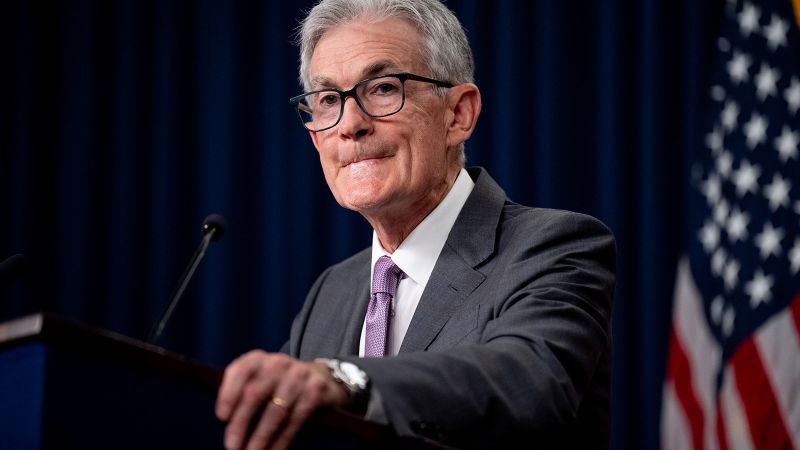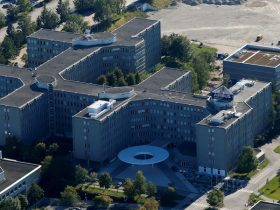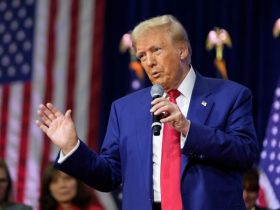Federal Reserve officials won’t say how former President Donald Trump winning a second term could impact the economy. Actually, the Fed prides itself on avoiding even the suggestion that it is wading into politics. But transcripts of closed-door Fed meetings from Trump’s first term give some clues about top economists’ true feelings about Trump’s economic agenda.
If voted into office in the November US presidential election, Trump has promised to impose sweeping tariffs of at least 10% on all foreign imports, up to 60% for some Chinese products, and levies as high as 100% for countries that abandon the dollar as their reserve currency.
If enacted, those policies could have wide-reaching effects on the US economy as well as economies across the globe.
To better understand what that could look like, US lawmakers have sought the input of the leader of the largest economy in the world: Fed Chair Jerome Powell.
But when asked in congressional hearings, press conferences and in letters from lawmakers to weigh in on the issue of tariffs, Powell has stood his ground. As head of the US central bank, an independent and apolitical agency, he said he has an obligation not to comment on political agendas.
“We also don’t comment on trade policy,” Powell said in response to a question from Sen. Jack Reed, a Democrat from Rhode Island, in testimony before the Senate Banking Committee in July, when asked about the effect of the tariffs that Trump has proposed.
“We don’t want to be involved … in politics in any way,” Powell said after July’s monetary policy meeting.
At the same time, the policies elected officials enact undeniably have an impact on the economy, and as Fed officials cast votes on where they believe interest rates should be to fulfill their mandate for stable prices and maximum employment, they have to consider the effect of fiscal policy.
“When Congress does deficit spending, that can be stimulative, that goes into our models,” Powell said in a “60 Minutes” interview earlier this year. “But … it’s not our role at all to be a judge of fiscal policy in any way.”
So it’s not surprising that Fed officials discussed the potential economic impact of the tariffs Trump either campaigned on or enacted when he was president. Although the size of the tariffs Trump floated or put forth during his first term were considerably smaller than the ones he’s currently campaigning on, transcripts documenting discussions Fed officials had around them give early hints of how central bankers could see Trump’s latest tariff proposals effecting the economy.
The transcripts of past meetings that are publicly available, the most recent being from the December 2018 monetary policy meeting, suggest that some Fed officials had legitimate concerns about Trump’s trade policy and its impact on the economy. The Fed keeps transcripts locked up for years to steer clear of political interference.
The Fed declined to comment to CNN.
When the Fed’s monetary policy committee met in December 2016 for the first time after Trump was elected, officials struggled with how to factor in the agenda he campaigned on involving steeper tariffs, tax cuts and stricter controls on immigration with forecasts they make on the economic outlook. Those forecasts influence the monetary policy decisions officials make.
The general consensus among officials was to wait and see what happens, but some were already bracing for negative consequences.
For instance, according to a meeting transcript, Loretta Mester, then-president of the Cleveland Fed, said: “Policies that constrain immigration and trade would have negative effects for the US economy over the medium and longer run, but I have not incorporated these into my projections at this point.”
Mester, who retired from working at the Fed three months ago, told CNN that such discussions are normal for Fed officials who have to take a forward-looking approach when setting interest rates. “This means policymakers need to assess the outlook and the risks around the outlook,” she said, adding that fiscal policy factors into that equation.
“Political considerations do not come into it and are never discussed at the Federal Open Market Committee (FOMC) meetings,” Mester said.
At that meeting, James Bullard, who was at that time president of the St. Louis Federal Reserve, quipped: “According to some interpretations of the Book of Revelations, when three unusual events occur together, they may be a sign that the apocalypse is near.”
“Let’s take stock,” he continued. “The Chicago Cubs have won the World Series, Donald Trump has won the presidency and Bob Dylan has won a Nobel Prize,” Bullard said, referring to three events that occurred in 2016. His comments were met with laughter from other meeting participants, according to the Fed’s transcript of the meeting. Bullard, now the dean of Purdue’s Mitch Daniels School of Business, did not respond to CNN’s request for comment.
At later meetings, as the Trump administration began to set the stage for a potential trade war with China, Fed officials started to sound more concerned. At times, they even veered into territory that appeared critical of political agendas.
“The professed goal of the Trump administration, to get tough on trade, could lead not necessarily to better trade deals for the United States, but just a significant increase in trade barriers and the resultant bad set of consequences that would flow from that, including higher inflation,” William Dudley, then Vice Chair of the Fed, said at the monetary policy meeting that took place from January 31 to February 1, 2017.
“So it seems to me that we may be trading a greater likelihood of a sustained expansion over the next year or two for a greater likelihood of a hard landing later,” Dudley added. A hard landing refers to when the Fed is unable to bring inflation down without causing the economy to enter a recession. Dudley, who is now president of Washington and Lee University, did not respond to CNN’s request for a comment.
“The longer-run effects of some of the policy changes being contemplated, in particular with respect to trade and immigration, could be quite negative,” Mester said at the same meeting. “There are other risks, too, including geopolitical risks, some arising from a potentially escalating array of ill-conceived US government policies.”
Read the full article here













Leave a Reply